外研版九年级英语上册教案Module 6 Unit 1
外研版九英语上册Module 6 Problems Unit 1 If I start after dinner, I'll finish it before I go to bed
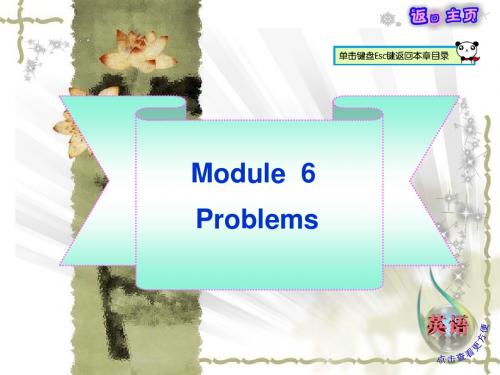
Complete the passage with the words in the box.
community instead consider knowledge habit shame
Tony wants to go to the library ,because he works there to help the _________ community .He can also read books there and increase his knowledge ________. But his father thinks it is a ________ shame that Tony does not ___________his homework to be more consider important .He wants Tony to get into the _____ habit of doing his homework ________ instead of doing other things first after school.
Language points
get into the habit of doing sth. 养成-----习惯 That‘s a shame!那多遗憾/多可惜! No deal,Tony. 托尼,这不行。 That's not the point. 那不是问题的关键。
Choose the correct answer.
1. Why does Tony say he will do his homework after dinner? a) Because he wants a rest from school work. b) Because he he can do his homework in the library. c) Because homework is less important than music. 2.Why does Tony's dad think Tony should not go to the library too much? a) Because he wants Tony to learn an instrument. b) Because working in the library is not good for Tony's study. c) Because Tony will not have enough time to study. 3. How does Tony feel about the work in the library? a) It is more interesting than homework and should come first. b) It is not as important as homework. c) It is good because he can help the community and read books there at the same tang to go with us. But she refused to go because she has got a baby. She said, “ If I have another chance next year, I will go with you.”
外研版九年级英语上册 Module 6 unit1 If I start after dinner, I'll finish it before I go to bed.教案
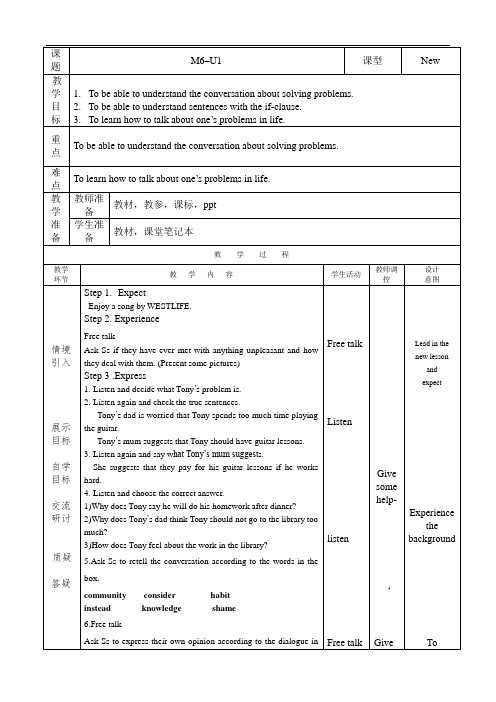
Ask Ss to read Everyday Englishand decide which two can only be used for disagreeing.Then ask Ss to choose one of the expressions in Everyday English and make a conversation.
作业布置------必做作业:Words & phrases选做作业:导航M6—U1
板
书
设
计
Module 6---Unit 1
结合有效教学,围绕本课达成目标、教学方法、学习方法、课程资源的开发与利用------进行反思
本课目标
达成情况
finished
9.Betty always spends her freetime______________(play) tennis.
10.If it _____________(be) fine tomorrow, we’ll go shopping.
Do some exercises
Guide
To consolidate the if-clause
教学过程
教学
环节
教学内容
学生活动
入
展示
目标
自学
目标
交流
研讨
质疑
答疑
Step 1.Expect
Enjoy a song by WESTLIFE.
Step 2.Experience
Free talk
Ask Ss if they haveever met with anything unpleasantand how they deal with them. (Present some pictures)
外研版九年级英语上册:Module 6 Problems教案 (2)
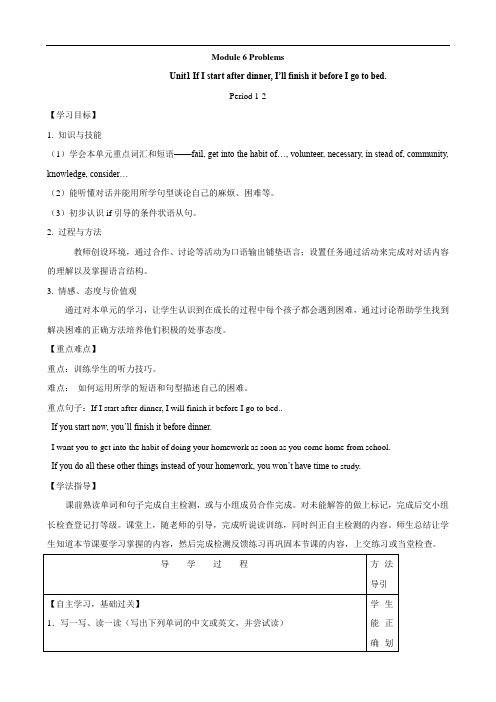
Module 6 ProblemsUnit1 If I start after dinner, I’ll finish it before I go to bed.Period 1-2【学习目标】1. 知识与技能(1)学会本单元重点词汇和短语——fail, get into the habit of…, volunteer, necessary, in stead of, community, knowledge, consider…(2)能听懂对话并能用所学句型谈论自己的麻烦、困难等。
(3)初步认识if引导的条件状语从句。
2. 过程与方法教师创设环境,通过合作、讨论等活动为口语输出铺垫语言;设置任务通过活动来完成对对话内容的理解以及掌握语言结构。
3. 情感、态度与价值观通过对本单元的学习,让学生认识到在成长的过程中每个孩子都会遇到困难,通过讨论帮助学生找到解决困难的正确方法培养他们积极的处事态度。
【重点难点】重点:训练学生的听力技巧。
难点:如何运用所学的短语和句型描述自己的困难。
重点句子:If I start after dinner, I will finish it before I go to bed..If you start now, you’ll finish it before dinner.I want you to get into the habit of doing your homework as soon as you come home from school.If you do all these other things instead of your homework, you won’t have time to study.【学法指导】课前熟读单词和句子完成自主检测,或与小组成员合作完成。
对未能解答的做上标记,完成后交小组长检查登记打等级。
课堂上,随老师的引导,完成听说读训练,同时纠正自主检测的内容。
2022年秋九年级英语外研版上册课件:Module6Unit1

4.如果你没有时间,我将替你去那里。 If you have no time, I will go there ___i_n_s_t_e_a_d___ ______o_f_____ you. 5. ——你不想下棋? ——那不是我想说的。 —You don't want to play chess? —____T_h_a_t_'_s___ __n__o_t__ ___t_h_e___ point ____________.
。 She went to school instead of staying at
home. 她没有待在家里而是上学去了。
应用
( B )1. What a nice day! We should go
sightseeing ______ watching TV in the hotel.
A.because of
instead of stop sb. from doing sth.
at the same time
托尼的父母想阻止他喜欢音乐,尽管他们 之前和他达成了协议。
如果你现在开始,你将在晚饭前完成它。 是的,没有必要现在就做。
真遗憾。 那不是我想说的(我想说的不是那个意思)。
你应该想想最重要的事情是什么。
3 instead的用法
教材例句 If you do all these other things instead of your homework, you won't have time to study.如果你做所有其他这些事情而不是写作业 ,你就没有时间学习了。(教材第42页)
要点思维导图
很了解如何与小孩们相处。 How did they deal with the money? 他们是如何
2020外研版(新标准)英语九年级上册Module6ProblemsUnit1教案
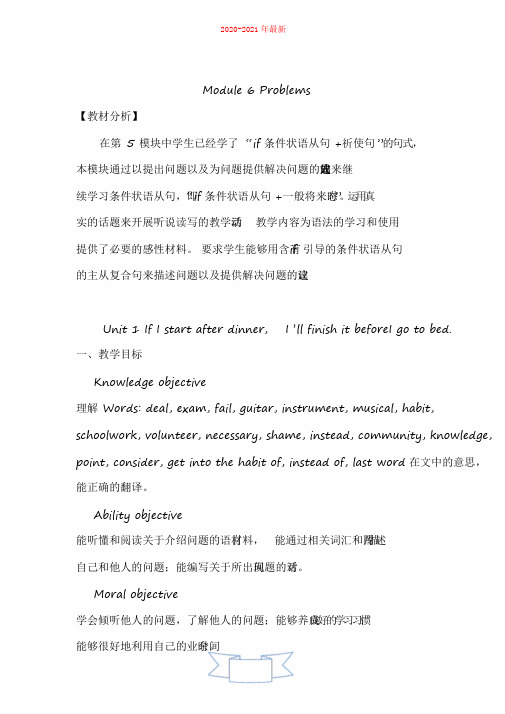
2020-2021年最新Module 6 Problems【教材分析】在第5 模块中学生已经学了“if条件状语从句+祈使句”的句式,方的式来继议本模块通过以提出问题以及为问题提供解决问题的建续学习条件状语从句,即“if条件状语从句+一般将来时态”。
运用真。
教学内容为语法的学习和使用实的话题来开展听说读写的教学活动i f 引导的条件状语从句提供了必要的感性材料。
要求学生能够用含有。
的主从复合句来描述问题以及提供解决问题的建议Unit 1 If I start after dinner, I ’ll finish it beforeI go to bed.一、教学目标Knowledge objective理解Words: deal, exam, fail, guitar, instrument, musical, habit, schoolwork, volunteer, necessary, shame, instead, community, knowledge, point, consider, get into the habit of, instead of, last word在文中的意思,能正确的翻译。
Ability objective片描述能听懂和阅读关于介绍问题的语言材料,能通过相关词汇和图话。
自己和他人的问题;能编写关于所出现问题的对Moral objective学会倾听他人的问题,了解他人的问题;能够养成;良好的学习习惯。
能够很好地利用自己的业余时间2020-2021年最新二、教学方法PWP method, task-based method三、读前导入Warming-up。
通过一些图片导入新课,引起学生对新课的兴趣四、教学过程Step 1 情境导入,通过对话的问题教师可以通过一些图片问学生一些和课文有关,活跃课堂气氛,导入新课,使学生进入极性调动学生学习英语的积。
情景学习。
板书课题Step 2 课前朗读1. 朗读单词Words: deal, exam, fail, guitar, instrument, musical, habit,schoolwork, volunteer, necessary, shame, instead, community,knowledge, point, consider,get into the habit of, instead of, last word注的习意单词中每个音节的发音和字母组合。
最新外研版九年级上册英语 Module 6 Unit 1【课件】

✔c) Because Tony will not have enough time to
study.
3 How does Tony feel about the work in the library? a) It is more interesting than homework and should come first. b) It is not as important as homework.
Everyday English
That’s a shame. No deal. Your mean… That’s not the point.
Now work in groups. Discuss what the problem is between Tony and his father. Give your advice.
外研版九年级英语上册 Module 6 Problems 全模块各单元教学设计 教案
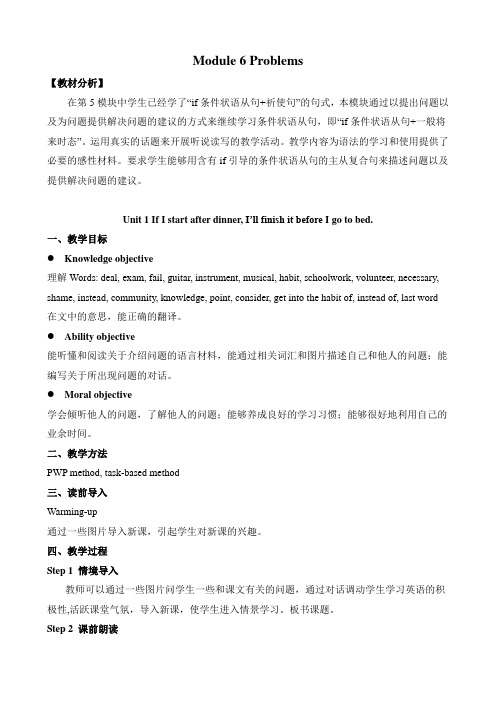
Module 6 Problems【教材分析】在第5模块中学生已经学了“if条件状语从句+祈使句”的句式,本模块通过以提出问题以及为问题提供解决问题的建议的方式来继续学习条件状语从句,即“if条件状语从句+一般将来时态”。
运用真实的话题来开展听说读写的教学活动。
教学内容为语法的学习和使用提供了必要的感性材料。
要求学生能够用含有if引导的条件状语从句的主从复合句来描述问题以及提供解决问题的建议。
Unit 1 If I start after dinner, I’ll finish it before I go to bed.一、教学目标●Knowledge objective理解Words: deal, exam, fail, guitar, instrument, musical, habit, schoolwork, volunteer, necessary, shame, instead, community, knowledge, point, consider, get into the habit of, instead of, last word 在文中的意思,能正确的翻译。
●Ability objective能听懂和阅读关于介绍问题的语言材料,能通过相关词汇和图片描述自己和他人的问题;能编写关于所出现问题的对话。
●Moral objective学会倾听他人的问题,了解他人的问题;能够养成良好的学习习惯;能够很好地利用自己的业余时间。
二、教学方法PWP method, task-based method三、读前导入Warming-up通过一些图片导入新课,引起学生对新课的兴趣。
四、教学过程Step 1 情境导入教师可以通过一些图片问学生一些和课文有关的问题,通过对话调动学生学习英语的积极性,活跃课堂气氛,导入新课,使学生进入情景学习。
板书课题。
Step 2 课前朗读1. 朗读单词Words: deal, exam, fail, guitar, instrument, musical, habit, schoolwork, volunteer, necessary, shame, instead, community, knowledge, point, consider,get into the habit of, instead of, last word注意单词中每个音节的发音和字母组合。
外研版英语九年级上module6unit1课文及其翻译

Module 6 save our world
UNIT1 It’s wasteful to throw away paper and metal.
扔掉纸张和金属是很浪费的行为。
Betty:Hey, you guys! 嘿,伙计Biblioteka ! Guess what!
猜猜!
We've just got an email from a reader of our New Standard!
“……例如关灯,那样我们就不浪费电了。”他在结束时说:“我有信心如果人人都想着环境和循环使用的话,我们就可以保护空气和海洋,而且可以帮助拯救我们的世界。如果我们不这样做的话,未来就没有希望。”
Tony:Let's ask Zhao Ming to write something.
让我们邀请赵明写点东西。
太好了!上面说什么?他说:“当我正在做我最喜欢的科目的作业时,我看了你们那令人愉快的在线杂志。”
Daming:He read Mr Jackson's article!
他读了杰克逊先生的文章!
Betty:He says, "When are you going to write about environmental education?
“……筹款帮助贫困地区的学生。但是不仅仅是在学校,而且在家里,我们要节约能源和循环使用……?
外研版九年级英语上册教案 M6 听说课第2课时

教学环节
教学活动
评价要点
Step1
Revise
1.Warming up: Words time.
2.Checking time: Have a dictation.
Preparation: Book; notebook; red pen; passion
3.Sentence time: Recite the key sentences that you underlined yesterday.
意义:表达的是事情发展的条件
结构:①if从句,主句②主句+if从句
Question:Couldyou summarize the rule of if clause?
2.Practice: translate the sentences.
①如果明天不下雨,我会去上学。(if)
__________________________________________________
②如果你努力学习,你就会取得进步。(if)
__________________________________________________
1.准确找出,读熟
2.辨析主句从句。
3.小组讨论,总结规律。
4.能翻译句子和词汇填空。
Step 4Leabharlann Language points
1.I want you toget into the habit ofdoing your homeworkas soon asyou come home from school.
If you start now, you will finish it before dinner.
外研版英语九年级上册(教学设计)Module 1 Unit 1
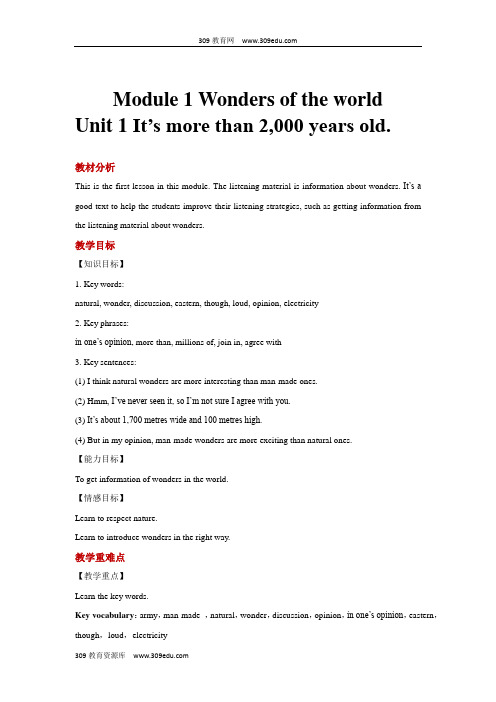
Module 1 Wonders of the worldUnit 1 It’s more than 2,000 years old.教材分析This is the first lesson in this module. The listening material is information about wonders. It’s a good text to help the students improve their listening strategies, such as getting information fromthe listening material about wonders.教学目标【知识目标】1. Key words:natural, wonder, discussion, eastern, though, loud, opinion, electricity2. Key phrases:in one’s opinion, more than, millions of, join in, agree with3. Key sentences:(1) I think natural wonders are more interesting than man-made ones.(2) Hmm, I’ve never seen it,so I’m not sure I agree with you.(3) It’s about 1,700 metres wide and 100 metres high.(4) But in my opinion, man-made wonders are more exciting than natural ones.【能力目标】To get information of wonders in the world.【情感目标】Learn to respect nature.Learn to introduce wonders in the right way.教学重难点【教学重点】Learn the key words.Key vocabulary:army,man-made ,natural,wonder,discussion,opinion,in one’s opinion,eastern,though,loud,electricityKey structures: join in,That sounds great., in my opinion, looked over, looked down to, Far below me, the ground fell away and down to a river.【教学难点】Learn to listen for main points about wonders.Learn to introduce wonders.课前准备Multimedia教学过程Step I. Warm-up1. Know about wonders of the world.T shows some pictures to introduce wonders of the world: the Three Gorges Dam, the Terracotta Army, the Giant’s Causeway and Victoria Falls.2. Match the pictures with wonders.3. Ss use some adjectives to describe the wonders: ancient, modern, man-made and natural.【设计意图】用图片直观,形象地引入本课话题,激发学生兴趣,活跃课堂气氛,为正式进入课文内容的学习进行热身。
Module 6 Unit 1 教学设计-外研版九年级英语上册
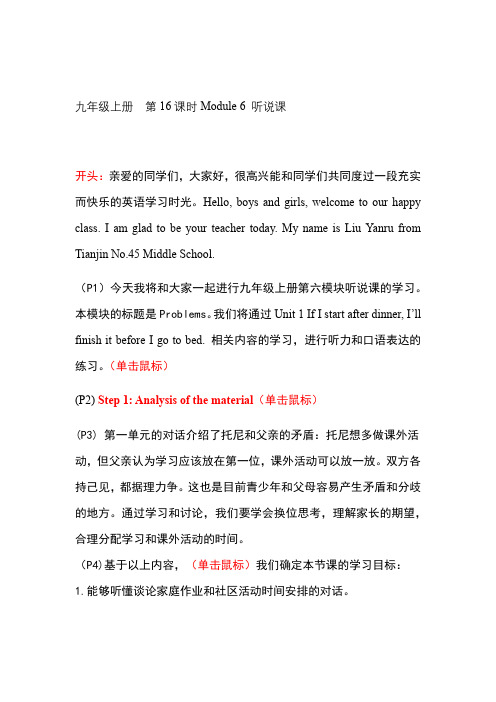
九年级上册第16课时Module 6 听说课开头:亲爱的同学们,大家好,很高兴能和同学们共同度过一段充实而快乐的英语学习时光。
Hello, boys and girls, welcome to our happy class. I am glad to be your teacher today. My name is Liu Yanru from Tianjin No.45 Middle School.(P1)今天我将和大家一起进行九年级上册第六模块听说课的学习。
本模块的标题是Problems。
我们将通过Unit 1 If I start after dinner, I’ll finish it before I go to bed. 相关内容的学习,进行听力和口语表达的练习。
(单击鼠标)(P2) Step 1: Analysis of the material(单击鼠标)(P3) 第一单元的对话介绍了托尼和父亲的矛盾:托尼想多做课外活动,但父亲认为学习应该放在第一位,课外活动可以放一放。
双方各持己见,都据理力争。
这也是目前青少年和父母容易产生矛盾和分歧的地方。
通过学习和讨论,我们要学会换位思考,理解家长的期望,合理分配学习和课外活动的时间。
(P4)基于以上内容,(单击鼠标)我们确定本节课的学习目标:1.能够听懂谈论家庭作业和社区活动时间安排的对话。
2.能够正确运用“If从句(一般现在时)+主句(一般将来时)”的条件状语从句。
3.能够交流学业中或与家长相处时遇到的问题并提出建议。
(单击鼠标)(P5)Step 2: Leading-in(单击鼠标)(P6)同学们,在日常生活中,你们有什么烦恼吗?(单击鼠标)关于烦恼和问题,我想可能是来自(单击鼠标)功课,朋友,家人,老师,也可能是生活或者健康方面等等。
(P7)下面我们就这一话题进入(单击鼠标)第一单元的知识学习。
Step3:Knowledge learning(单击鼠标)(P8)词汇学习:Number One,instrument 名词乐器;仪器请跟我读:instrument,instrumentAnyway,you wanted me to learn an instrument.而且,您不是让我学一门乐器嘛。
《外研版》初三英语Module6Unit1教学设计与反思
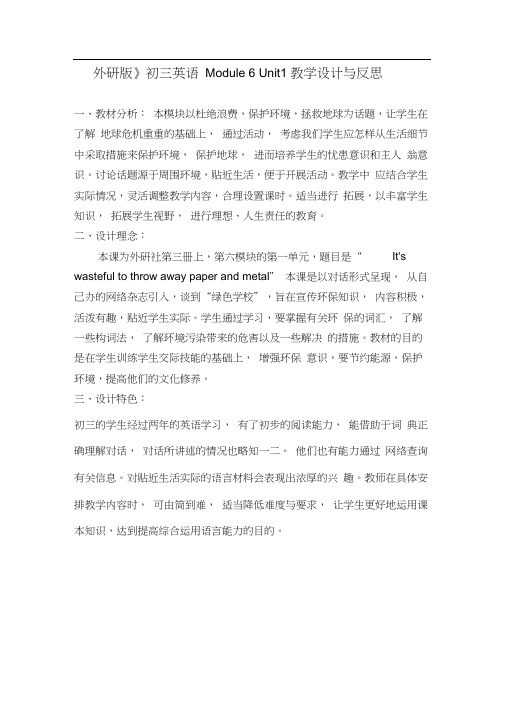
外研版》初三英语Module 6 Unit1 教学设计与反思一、教材分析:本模块以杜绝浪费,保护环境,拯救地球为话题,让学生在了解地球危机重重的基础上,通过活动,考虑我们学生应怎样从生活细节中采取措施来保护环境,保护地球,进而培养学生的忧患意识和主人翁意识。
讨论话题源于周围环境,贴近生活,便于开展活动。
教学中应结合学生实际情况,灵活调整教学内容,合理设置课时。
适当进行拓展,以丰富学生知识,拓展学生视野,进行理想、人生责任的教育。
二、设计理念:本课为外研社第三册上,第六模块的第一单元,题目是“It's wasteful to throw away paper and metal” 本课是以对话形式呈现,从自己办的网络杂志引入,谈到“绿色学校”,旨在宣传环保知识,内容积极,活泼有趣,贴近学生实际。
学生通过学习,要掌握有关环保的词汇,了解一些构词法,了解环境污染带来的危害以及一些解决的措施。
教材的目的是在学生训练学生交际技能的基础上,增强环保意识,要节约能源,保护环境,提高他们的文化修养。
三、设计特色:初三的学生经过两年的英语学习,有了初步的阅读能力,能借助于词典正确理解对话,对话所讲述的情况也略知一二。
他们也有能力通过网络查询有关信息。
对贴近生活实际的语言材料会表现出浓厚的兴趣。
教师在具体安排教学内容时,可由简到难,适当降低难度与要求,让学生更好地运用课本知识,达到提高综合运用语言能力的目的。
四、教案流程图:Free talk,Warming up Watch a video and discuss围绕主题,设计语言交际活动Step 4: Liste n aga in and discussquesti ons1)What should we do?2)What shouldn ' t we do?Step 5:Practice1)学生分角色朗读对话,2)讨论难点,教师加以点拨,让学生来解释,教师来补充。
外研版九年级英语上册 Module 6 unit1 If I start after dinner, I'll finish it before I go to bed.教案
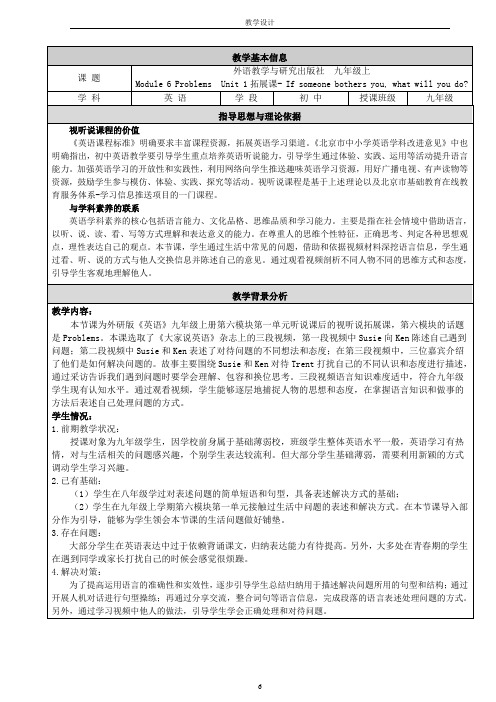
初三年级__班姓名_________ I. Watch and fill in the blanks.Susie Questions Ken He is ____ ________. 1. What do they think of Trent? He is a _______ guy.They are _______. 2. What do they think of Trent’s stories? They are ______, and I laugh.He _____ bothers me. 3. How often does Trent bother them? He bothers me _________.II. Watch and match.I will tell them. I’ll try to understand why they did that.I will tell them. I will have to talk to you later.I try to be patient. I try to ask them questions to understandthem. I try to remember I probably bother others.PassageI don’t mind people at all; I like to talk to people. So when they come to see me, I a lways like tohave a conversation. But sometimes if I’m very busy, I can’t talk to them, I will just tell them rightaway, I’m sorry I will have to talk to you later, I’m very busy right now. But pretty soon, I’ll be able totalk to you. Let’s do it then.Do people bother me? Of course, I think in any relationship, sometimes people will bother you.What do I do? Well, if it is a close friend or someone in my family, then I will talk to them, I’ll try tounderstand why they did the things that they did. And afterwards, we usually feel better.Do people bother me? Well, not usually, I usually get along well with other people. But sometimes when I’m in traveling, I meet someone who I just don’t understand, they acting the waythat does bother me. When that happens, I try to be patient, I try to ask them questions to understandwhy they’re acting the way that they are, and I try to remember that I probably bother other peoplesometimes, too.And they need to be patient with me.III. Listen and take notes.Q1:__________________________________________________________________________Q2:__________________________________________________________________________Q3:__________________________________________________________________________A: Write a composition, telling what you can do if someone bothers you. B: Make a poster to tell your feeling after this lesson.。
Module 6 Unit 1 外研版英语九年级上册知识点详解
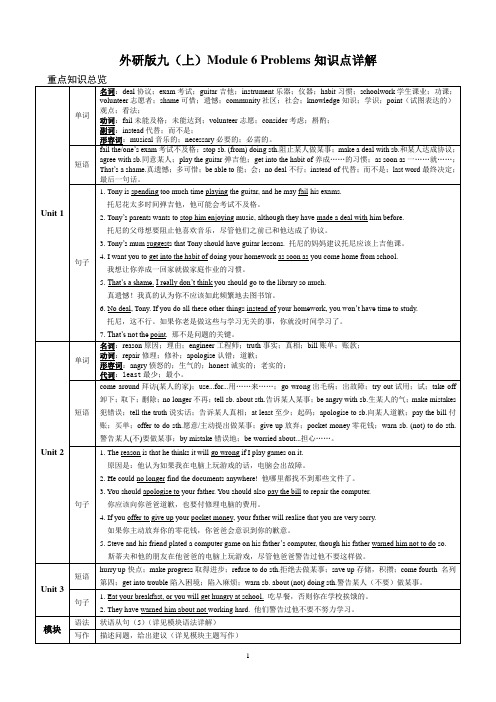
外研版九(上)Module 6 Problems知识点详解Unit 1If I start after dinner, I’ll finish it before I go to bed.★(A1).【知识点再现】Tony is spending too much time playing the guitar, and he may fail his exams. 托尼花太多时间弹吉他,他可能会考试不及格。
【知识点1】【辨析】spend,take,cost与pay的用法辨析:①spend其主语是人,宾语可以是金钱、时间、精力等,意为“度过”、“花费”,常用于以下两种句型:●sb.+spend+时间/金钱+(in) doing sth. 意为“某人花费时间/金钱做某事”。
如:Jim spends too much time playing computer games. 吉姆花太多时间玩电脑游戏。
●sb.+spend+时间/金钱+on sth. 意为“某人在某方面花费时间/金钱”。
如:Lucy often spends her money on fine clothes. 露西经常把钱花在漂亮衣服上。
②take用作“花费”时,常用于以下句型:●It takes/took+sb.+time+to do sth.“做某事花了某人多少时间”,It是形式主语,真正的主语为to do sth.It took them three years to build this road. 他们用了三年的时间修完了这条路。
●doing sth. takes sb.+时间“做某事花了某人多少时间”。
如:Repairing this car took him the whole afternoon. 他花了一下午修车。
③cost其主语是物、事情或用it作形式主语,宾语可以是钱、时间等,意为“价钱为;花费;值”等。
常用句型:●sth.+cost+money. 意为“某物花了多少金钱”。
外研版(一起)第一册英语教案Module6 unit1&unit 2
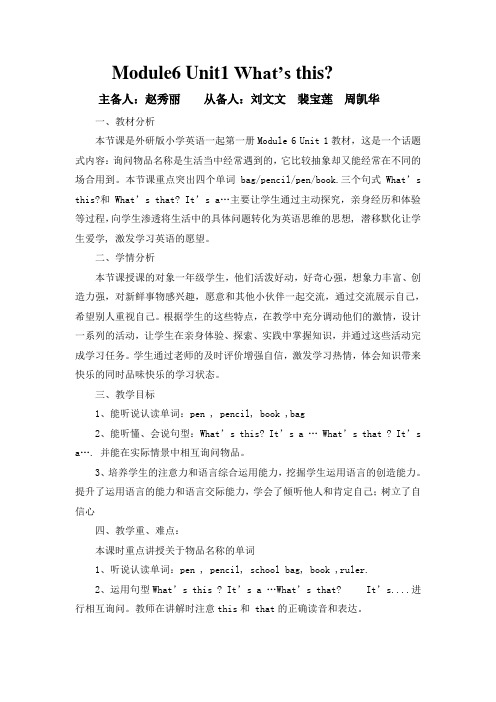
Module6 Unit1 What’s this?主备人:赵秀丽从备人:刘文文裴宝莲周凯华一、教材分析本节课是外研版小学英语一起第一册Module 6 Unit 1教材,这是一个话题式内容:询问物品名称是生活当中经常遇到的,它比较抽象却又能经常在不同的场合用到。
本节课重点突出四个单词bag/pencil/pen/book.三个句式What’s this?和What’s that? It’s a…主要让学生通过主动探究,亲身经历和体验等过程,向学生渗透将生活中的具体问题转化为英语思维的思想, 潜移默化让学生爱学, 激发学习英语的愿望。
二、学情分析本节课授课的对象一年级学生,他们活泼好动,好奇心强,想象力丰富、创造力强,对新鲜事物感兴趣,愿意和其他小伙伴一起交流,通过交流展示自己,希望别人重视自己。
根据学生的这些特点,在教学中充分调动他们的激情,设计一系列的活动,让学生在亲身体验、探索、实践中掌握知识,并通过这些活动完成学习任务。
学生通过老师的及时评价增强自信,激发学习热情,体会知识带来快乐的同时品味快乐的学习状态。
三、教学目标1、能听说认读单词:pen , pencil, book ,bag2、能听懂、会说句型:What’s this? It’s a …What’s that ? It’s a….并能在实际情景中相互询问物品。
3、培养学生的注意力和语言综合运用能力,挖掘学生运用语言的创造能力。
提升了运用语言的能力和语言交际能力,学会了倾听他人和肯定自己;树立了自信心四、教学重、难点:本课时重点讲授关于物品名称的单词1、听说认读单词:pen , pencil, school bag, book ,ruler.2、运用句型What’s this ? It’s a …What’s that? It’s....进行相互询问。
教师在讲解时注意this和 that的正确读音和表达。
3、激发学生的学习兴趣和积极思维,使他们在实际运用中体验学习英语的乐趣与意义。
外研版_九年级英语上册_M6U1_教案
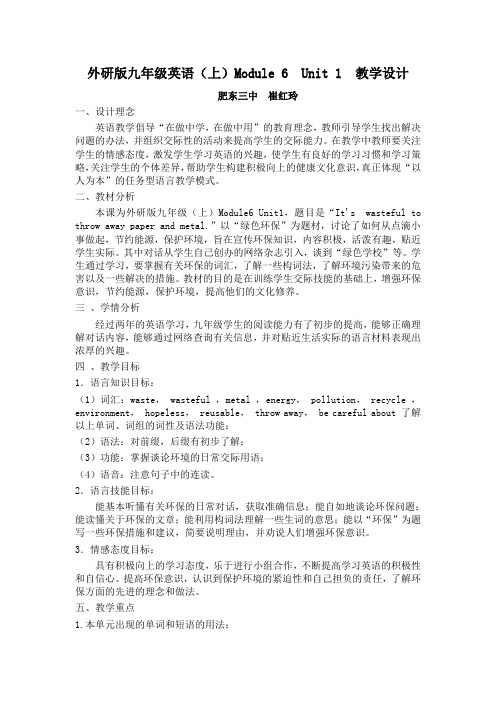
外研版九年级英语(上)Module 6 Unit 1 教学设计肥东三中崔红玲一、设计理念英语教学倡导“在做中学,在做中用”的教育理念,教师引导学生找出解决问题的办法,并组织交际性的活动来提高学生的交际能力。
在教学中教师要关注学生的情感态度,激发学生学习英语的兴趣,使学生有良好的学习习惯和学习策略,关注学生的个体差异,帮助学生构建积极向上的健康文化意识,真正体现“以人为本”的任务型语言教学模式。
二、教材分析本课为外研版九年级(上)Module6 Unit1,题目是“It's wasteful to throw away paper and metal.”以“绿色环保”为题材,讨论了如何从点滴小事做起,节约能源,保护环境,旨在宣传环保知识,内容积极,活泼有趣,贴近学生实际。
其中对话从学生自己创办的网络杂志引入,谈到“绿色学校”等。
学生通过学习,要掌握有关环保的词汇,了解一些构词法,了解环境污染带来的危害以及一些解决的措施。
教材的目的是在训练学生交际技能的基础上,增强环保意识,节约能源,保护环境,提高他们的文化修养。
三、学情分析经过两年的英语学习,九年级学生的阅读能力有了初步的提高,能够正确理解对话内容,能够通过网络查询有关信息,并对贴近生活实际的语言材料表现出浓厚的兴趣。
四、教学目标1.语言知识目标:(1)词汇:waste, wasteful ,metal ,energy, pollution, recycle ,environment, hopeless, reusable, throw away, be careful about 了解以上单词、词组的词性及语法功能;(2)语法:对前缀,后缀有初步了解;(3)功能:掌握谈论环境的日常交际用语;(4)语音:注意句子中的连读。
2.语言技能目标:能基本听懂有关环保的日常对话,获取准确信息;能自如地谈论环保问题;能读懂关于环保的文章;能利用构词法理解一些生词的意思;能以“环保”为题写一些环保措施和建议,简要说明理由,并劝说人们增强环保意识。
Module6Unit1第四课时教案2023-2024学年外研版英语九年级上册

Module6 Unit1 第四课时教案2023-2024学年外研版英语九年级上册一、教学内容分析本节课的主要教学内容为Module 6 Unit 1第四课时,外研版英语九年级上册。
本节课的内容主要包括两部分:一是阅读理解,以一篇关于保护环境的短文为主;二是口语交流,围绕环境保护主题进行讨论和表达。
教学内容与学生已有知识的联系:学生在之前的课程中已经学习了关于环境保护的基本概念和表达方式,本节课将进一步加深学生对这些知识的理解和运用。
通过阅读理解,学生可以巩固和扩展词汇量,提高阅读理解能力;通过口语交流,学生可以提高自己的口头表达能力,学会如何用英语讨论和表达环境保护的观点。
二、核心素养目标本节课的核心素养目标主要包括以下三个方面:1. 语言能力:通过阅读理解和口语交流,提高学生的英语语言运用能力,能够准确、流畅地表达环境保护的观点和想法。
2. 文化意识:通过学习关于环境保护的短文,使学生了解不同文化背景下对环境保护的认识和态度,提高学生的文化意识。
3. 思维品质:通过分析环境保护的问题,培养学生的批判性思维和创造性思维,使学生能够独立思考、分析问题,并提出解决问题的方案。
三、教学难点与重点1. 教学重点:本节课的核心内容是关于环境保护的阅读理解和口语交流。
具体重点包括:(1)掌握文章中的关键信息和词汇,如“environmental protection”、“pollution”、“conservation”等。
(2)理解文章的结构和逻辑关系,能够概括和提炼文章的主旨大意。
(3)运用所学知识,用英语进行口头表达,讨论环境保护的问题和解决方案。
2. 教学难点:本节课的难点在于学生对于环境保护相关词汇的理解和运用,以及对于文章深层次含义的把握。
具体难点包括:(1)对于一些专业性较强的词汇,如“deforestation”、“carbon footprint”等,学生可能不太熟悉,需要教师进行解释和举例。
- 1、下载文档前请自行甄别文档内容的完整性,平台不提供额外的编辑、内容补充、找答案等附加服务。
- 2、"仅部分预览"的文档,不可在线预览部分如存在完整性等问题,可反馈申请退款(可完整预览的文档不适用该条件!)。
- 3、如文档侵犯您的权益,请联系客服反馈,我们会尽快为您处理(人工客服工作时间:9:00-18:30)。
Module 6 ProblemsUnit 1 If I start after dinner, I’ll finish itbefore I go to bed.教材分析This is the first lesson in this module. The listening material is information aboutproblems. It’s a good text to help the students improve their listening strategies, such as getting information from the listening material.教学目标【知识目标】1. Key words:deal, exam, fail, guitar, instrument, musical, habit, volunteer, necessary, shame, instead,community, knowledge, point, consider2. Key phrases:get into the habit of, instead of, last word, make a deal with, agree with, fail one’s exams, as soon as3. Key sentences:(1) If I start after dinner, I’ll finish it before I go to bed.(2) I want you to get into the habit of doing your homework as soon as you come home from school.(3) That’s a shame.(4) That’s not the point.【能力目标】1. To understand the dialogue about homework and activities.2. To talk about problems between students and parents and give advice.【情感目标】1. To get into the habit of sharing ideas and learn to ask for help and advice.2. To understand the dialogue about homework and activity arrangement.3. To talk about the problems in their daily life and give advice.教学重难点【教学重点】Key sentences:(1) If I start after dinner, I’ll finish it before I go to bed.(2) I want you to get into the habit of doing your homework as soon as you come home from school.(3) That’s a shame.(4) That’s not the point.【教学难点】To practice listening and speaking abilities.课前准备Multimedia教学过程Step I Warming up and leading in1. Talk about some situations in daily life.If you feel hungry, you will ____________.If you feel tired, you will ________________.If you are ill, you will _______________.…2. If Tony’s friends have time, they will play musical instruments.If Tony has time, he will play the guitar【设计意图】引导学生进入情境,为本单元的句型做铺垫If …, … will …Step II Practice1. L isten and find out what’s Tony’s problem.a) Tony is spending too much time playing the guitar, and he may fail his exams.b) All of Tony’s friends can play musical instruments after class, but he has to study hard.c) Tony’s parents want to stop him enjoying music, although they have made a deal with him before.2. Listen again and check (√) the true sentences.1 Tony’s dad is worried that Tony spends too much time playing the guitar.2 Tony has failed an exam.3 Tony’s mum wants Tony to stop playing the guitar.4 Tony’s friends play music together with his friends.5 Tony’s mum suggests that Tony should have guitar lessons.6 Tony’s dad does not agree with Tony’s mum’s suggestion.【设计意图】学生熟悉情境,为下面的听力做铺垫。
Step III Pre-listeningSs look at the pictures and talk about their problems.What are their problems?He gets into the habit of being late.The boy fails his exam.He wants to do volunteer work in the community, but his father doesn’t agree with him.【设计意图】在情感上引起学生共鸣,激发学生学习兴趣。
Step IV While –listening1. Listen and answer the question.What’s the problem between Tony and his father?2. Listen again and complete the table.【设计意图】通过设计由浅入深、不同层次的听力问题,训练学生听辨细节信息的能力,并让学生熟悉话题。
Step V Post- listening1. Work in groups. Discuss what the problem is between Tony and his father. Give your advice.2. Complete the passage with the words in the box.Step VI Language points1. I want you to get into the habit of doing your homework as soon as you come home from school. 我想让你养成一放学回家就做家庭作业的习惯。
get into the habit of doing sth. 的意思是“养成……习惯”。
例如:You should get into the habit of planning your time.你应该养成计划好时间的习惯。
habit 还能和其他动词搭配,表达不同的意思。
例如:She has a habit of playing with her hair when she is nervous. 她有一紧张就抚弄头发的习惯。
2. That’s a shame. 真遗憾。
It’s a shame. / That’s a shame. / What a shame!经常用在口语中,表示“真遗憾/可惜呀。
例如:Oh, it’s raining. What a shame! 啊,下雨了。
真糟糕!3. I work in the library and I’m also able to read books there. 我在图书馆干活儿,而且也能在那儿看书。
这里的work 不是指上班,而是指做志愿者。
4. No deal, Tony. 托尼,这不行。
deal 在这里的意思是“协议”。
在口语表达中,我们常用make a deal 表示“达成协议”等意思。
此处,No deal. 表示不同意,可译成“这不行”。
例如:- You wash the car and I’ll let you use it tonight. 你洗车,我就让你今晚用车。
- Deal! 成!5. If you do all these things instead of your homework, you won’t have time to study.如果你不做作业,而去做些其他的事情,你就没有时间学习了。
1) instead of后面常跟名词、代词和动名词,偶尔也跟复合结构。
I have come instead of my brother. He is ill.我代替我哥哥来了。
他病了。
I will go instead of you.是我走,不是你。
Instead of doing it himself, he got a man to do it. 他自己没有做这件事,而是让其他人做了。
It’s me that should ask you instead of you asking me. 应该是我问你而不是你问我。
2) 其后接形容词、副词、动词、不定式、介词短语和从句。
Taking exercise every day makes him look younger instead of old. 每天锻炼身体使他显得更年轻而不是苍老。
